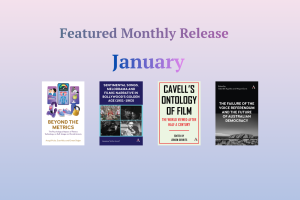Talk of the Town: 5 Things that Happened in the Publishing Industry in April 2020
The world remains restless in April 2020 as some countries and states prepare for reopening while others intensify their fight to combat the novel coronavirus.
That’s why Anthem Press has curated 5 note-worthy articles that contribute to a holistic understanding of the current state and future trajectory of the publishing industry. Whether data, news or commentary, we aim to keep you informed.
1. Publishers are offering resources and literature to assist avid book readers, teachers, students, researchers and medical professionals.
The Association of American Publishers is aggregating a working list of resources and materials dedicated to public consumption. From virtual wellness discussions to children’s story time to free access to the latest research on the novel coronavirus, there’s no denying that #BooksConnectUs.
2. A dark cloud loomed over World Book and Copyright Day celebrations on April 23.
Publishing Perspectives reports that on April 23, industry leaders issued statements on the grim realities of the book publishing world as “already struggling for oxygen” and facing “catastrophic consequences.” Barely any businesses will come out of the pandemic unscathed; what are the necessary steps for economic recovery?
3. A triumph for the global audiobooks industry: Is this the future of book publishing and distribution?
Stockholm-based audio book app BookBeat jumped to the #4 most downloaded mobile app after the pandemic, a sign that stories and books are in high demand but not in the way we usually read them. Interviewed by Publishing Perspectives, BookBeat founder Niclas Sandin expects publishers to follow suit with future investments in audio.
4. The National Emergency Library controversy begs us to redefine copyright laws in the digital age.
Publishers Weekly reports that Internet Archive has launched the National Emergency Library project, which provides 1.4 million scans of 20th century print books free for borrowing for students learning from home. Authors and publishers have pushed back, accusing the organization of piracy. This could mean future revisions to the Digital Millennium Copyright Act in order to meet the needs of digital libraries, authors, and publishers in the middle.
5. New works by writers with disabilities hit the shelves, but there’s always room for improving representation.
Publishing Perspectives celebrates need-to-know writers Judith Heumann, Alice Wong, Jaipreet Verdi, and David Egan as they describe their successful book release journeys. But the authors vocalize a shared concern that the lack of representation in the book industry must change in order to include more voices of those with disabilities in the narrative.
Latest Posts

Voice, Democracy and the Future of Reform
This is a guest post by Gabrielle Appleby and Megan Davis, authors of The Failure of the Voice Referendum and the Future of Australian Democracy Don’t be fooled by...

Talk of the Town: Monthly Publishing Industry News Digest
Global publishing and research continue to shift under the pressures of technological change, policy reform and international collaboration. From market insights at major book fairs to debates around open access,...

Featured Monthly Releases – January 2026
January opens the year with a sense of renewal and momentum, setting the tone for the months ahead. Discover our featured releases for this month. The Failure of the Voice...

When the Mirror Lies: A Female Bodybuilder’s Battle with Fitness Tech and Body Dysmorphia
This is a guest post by Asegul Hulus, author of Beyond the Metrics: The Psychological Impact of Fitness Technology on Self-Image and Social Anxiety Six months have passed since I...


